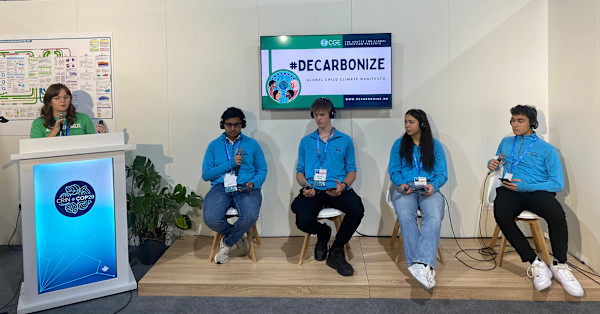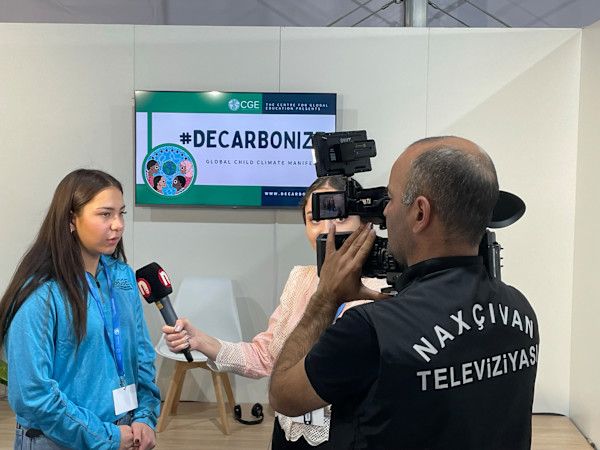Nov 21, 2024


#Decarbonize: Centering the Voice of Children in Climate Conversations
In the CRIN pavilion at COP29, youth panelists Arjun from India, Riley from Australia, Payton, an Indigenous student from Canada, and Teoman from Azerbaijan joined moderator Rebecca Moon, Online Learning Coordinator for the Centre for Global Education, to share the #Decarbonize Global Child Climate Manifesto, a call for action to climate stakeholders, written by children from around the world.
Arjun explained that the #Decarbonize program, hosted by the Centre for Global Education, brings together tens of thousands of students from over 75 countries in virtual classrooms. The Climate Manifesto document contains four main sections: policy, education, local action, and communication, and 13 statements, all created by children.
Under Government Policy, the manifesto demands that countries explicitly include and fund commitments to climate education in their Nationally Determined Contributions (NDCs), that countries share their NDCs in universally accessible formats, and that governments establish structured platforms that facilitate the meaningful involvement of children in climate policy discussions.
"Scientific data can often be very difficult to understand for the average 12-year-old, so when we do provide these universally accessible formats, it will help all students understand this better, and therefore they will be able to positively impact the entire policy discussion on climate change," Arjun said.
Riley said in Australia, climate education is very limited.
"This is why organizations such as the Centre for Global Education are so vital for the youth," he said.
Under the Education section, some of the children's demands include calling for hands-on and experiential learning opportunities to be incorporated into climate education at all grades, and that climate education be integrated across all subjects to foster a holistic understanding of environmental challenges.
The Community Action statements include a request that communities play an active role in educating young people about sustainable practices through hands-on projects, and for the integration of Indigenous perspectives and traditional ecological knowledge into climate education.
Teoman from Baku, Azerbaijan, said he remembers travelling through the streets of the country as a young child and his parents telling him to close the window due to the pollution.
"I was thinking to myself, if I'm in a car and I have to close my window, what are these animals doing, what are the plants doing? If they have nowhere to hide, we need to fix this."
He shared the Communication portion of the Manifesto, including a push for collaboration between the scientific community, students, and communities to broaden perspectives and create feasible plans.
Payton from Canada said when she first got to COP29 she was very nervous to talk to anyone.
"But after talking to a few of them, I realized they're actually interested in what we have to say and want to hear more about it," she said. So much so, after the panel she was invited to provide a statement to a local news team.
Riley said he's grateful that youth have had a seat at the table at COP, and Arjun said he was glad to see multiple child-led organizations at the conference.
"It was very, very nice to see a larger presence from youth and children at COP," he said.